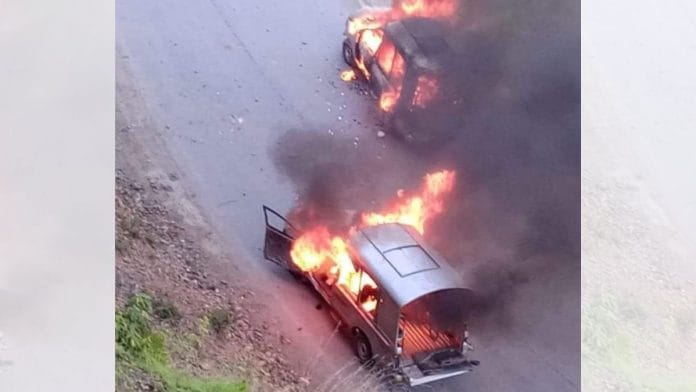New Delhi: Pakistani Rangers, a paramilitary force under the Pakistan Army, opened fire in Muzaffarabad killing at least four civilians protesting against inflation and exploitation, in what could escalate the already tense situation in Pakistan Occupied Kashmir (PoK).
The development came on a day when Pakistan Prime Minister Shehbaz Sharif ordered an “immediate release” of Pakistani Rs 23 billion for PoK after an emergency meeting in Islamabad to take stock of violent clashes in the region over the weekend.
Reports coming in from PoK said that the Pakistani Rangers, who were initially reported to have been withdrawn, opened indiscriminate fire as protesters from across the region marched to the capital.
According to Pakistan’s Friday Times, the latest tensions mark the culmination of the non-cooperation movement, which started in the region a year ago to protest against rising flour prices and electricity bills.
The protest movement, largely nonviolent so far, took an ugly turn Friday when local police and federal forces such as the Frontier and Punjab constabularies that Islamabad sanctioned to be deployed in the region to protect Chinese personnel and China–Pakistan Economic Corridor projects cracked down on the protesters.
On Saturday, PoK witnessed violent clashes between the police and the civilians amid a wheel-jam and shutter-down strike across the territory. The clashes left at least one police official dead and more than 90 others injured, according to Dawn.
Several videos on social media showed civilians chasing and beating up police personnel Saturday, a day after severe police action on protesters, including lathi-charge and firing of tear gas shells, besides blockades.
The protests are taking place under the Jammu Kashmir Joint Awami Action Committee (JAAC) banner, led by traders mostly. The protesters are seeking the provision of electricity, according to the hydropower generation costs in ‘Azad Jammu and Kashmir’ (AJK), subsidised wheat flour, and an end to the privileges of the elite class.
An earlier police crackdown Wednesday-Thursday night had led to the arrests of nearly 70 JAAC activists from their houses in the Muzaffarabad and Mirpur divisions, triggering clashes in Dadyal Thursday. Afterwards, the JAAC announced Friday’s shutter-down and wheel-jam strike, a day ahead of its planned long march towards Muzaffarabad.
“But what remains at the heart of it all is the public’s anger over the loot and plunder of the region’s resources and the enabling character of AJK’s political leadership towards this exploitation,” the Friday Times reported.
“The leadership is mostly dynastic — more than two-thirds are in their 70s and 80s — and almost all with luxurious bungalows in gated communities of Rawalpindi and Islamabad seem incapable of understanding the generational change, class dynamics and unbearable burden of unemployment which has taken the alienation and anger to a whole new level,” the Friday Times added.
After the emergency meeting in Islamabad, Chaudhry Anwarul Haq, the Prime Minister of what Pakistan refers to as ‘Azad Jammu and Kashmir’, Monday announced the notification of subsidies for wheat and electricity.
“No sensible person can disagree with the demand for cheap wheat and cheap electricity,” a report by Pakistan’s Aaj English TV quoted Haq as saying.
According to the report, Haq also announced that people would be charged Rs 3 per unit for consuming up to 100 units, Rs 5 per unit for consuming 100 to 300 units, and Rs 6 per unit for consuming more than 500 units. Haq also announced a decrease in the price of wheat from Rs 3,100 per 40kg to Rs 2,000 per kg. The subsidies, he added, are not temporary relief measures but would be permanent.
(Edited by Madhurita Goswami)
Also read: Shahid Afridi has advice for India and Babar Azam. Pakistanis ask ‘who the hell is he?’






